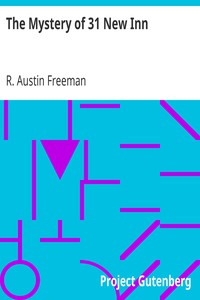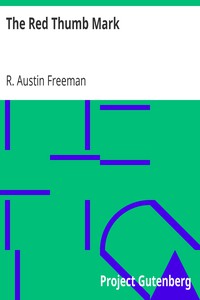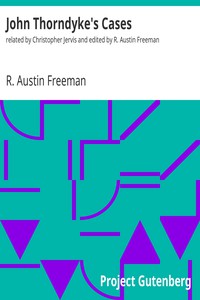The Mystery of 31 New Inn by R. Austin Freeman (adult books to read .TXT) 📗

- Author: R. Austin Freeman
Book online «The Mystery of 31 New Inn by R. Austin Freeman (adult books to read .TXT) 📗». Author R. Austin Freeman
Even then I did not relax my precautions. From one court to another I passed quickly, loitering in those dark entries and unexpected passages that are known to so few but the regular Templars, and coming out into the open only at the last where the wide passage of King's Bench Walk admits of no evasion. Half-way up the stairs, I stood for some time in the shadow, watching the approaches from the staircase window; and when, at length, I felt satisfied that I had taken every precaution that was possible, I inserted my key and let myself into our chambers.
Thorndyke had already arrived, and, as I entered, he rose to greet me with an expression of evident relief.
"I am glad to see you, Jervis," he said. "I have been rather anxious about you."
"Why?" I asked.
"For several reasons. One is that you are the sole danger that threatens these people—as far as they know. Another is that we made a most ridiculous mistake. We overlooked a fact that ought to have struck us instantly. But how have you fared?"
"Better than I deserved. That good lady stuck to me like a burr—at least I believe she did."
"I have no doubt she did. We have been caught napping finely, Jervis."
"How?"
"We'll go into that presently. Let us hear about your adventures first."
I gave him a full account of my movements from the time when we parted to that of my arrival home, omitting no incident that I was able to remember and, as far as I could, reconstituting my exceedingly devious homeward route.
"Your retreat was masterly," he remarked with a broad smile. "I should think that it would have utterly defeated any pursuer; and the only pity is that it was probably wasted on the desert air. Your pursuer had by that time become a fugitive. But you were wise to take these precautions, for, of course, Weiss might have followed you."
"But I thought he was in Hamburg?"
"Did you? You are a very confiding young gentleman, for a budding medical jurist. Of course we don't know that he is not; but the fact that he has given Hamburg as his present whereabouts establishes a strong presumption that he is somewhere else. I only hope that he has not located you, and, from what you tell me of your later methods, I fancy that you would have shaken him off even if he had started to follow you from the tea-shop."
"I hope so too. But how did that woman manage to stick to me in that way? What was the mistake we made?"
Thorndyke laughed grimly. "It was a perfectly asinine mistake, Jervis. You started up Kennington Park Road on a leisurely, jog-trotting omnibus, and neither you nor I remembered what there is underneath Kennington Park Road."
"Underneath!" I exclaimed, completely puzzled for the moment. Then, suddenly realizing what he meant, "Of course!" I exclaimed. "Idiot that I am! You mean the electric railway?"
"Yes. That explains everything. Mrs. Schallibaum must have watched us from some shop and quietly followed us up the lane. There were a good many women about and several were walking in our direction. There was nothing to distinguish her from the others unless you had recognized her, which you would hardly have been able to do if she had worn a veil and kept at a fair distance. At least I think not."
"No," I agreed, "I certainly should not. I had only seen her in a half-dark room. In outdoor clothes and with a veil, I should never have been able to identify her without very close inspection. Besides there was the disguise or make-up."
"Not at that time. She would hardly come disguised to her own house, for it might have led to her being challenged and asked who she was. I think we may take it that there was no actual disguise, although she would probably wear a shady hat and a veil; which would have prevented either of us from picking her out from the other women in the street."
"And what do you think happened next?"
"I think that she simply walked past us—probably on the other side of the road—as we stood waiting for the omnibus, and turned up Kennington Park Road. She probably guessed that we were waiting for the omnibus and walked up the road in the direction in which it was going. Presently the omnibus would pass her, and there were you in full view on top keeping a vigilant look-out in the wrong direction. Then she would quicken her pace a little and in a minute or two would arrive at the Kennington Station of the South London Railway. In a minute or two more she would be in one of the electric trains whirling along under the street on which your omnibus was crawling. She would get out at the Borough Station, or she might take a more risky chance and go on to the Monument; but in any case she would wait for your omnibus, hail it and get inside. I suppose you took up some passengers on the way?"
"Oh dear, yes. We were stopping every two or three minutes to take up or set down passengers; and most of them were women."
"Very well; then we may take it that when you arrived at the Mansion House, Mrs. Schallibaum was one of your inside passengers. It was a rather quaint situation, I think."
"Yes, confound her! What a couple of noodles she must have thought us!"
"No doubt. And that is the one consoling feature in the case. She will have taken us for a pair of absolute greenhorns. But to continue. Of course she travelled in your omnibus to Kensington—you ought to have gone inside on both occasions, so that you could see every one who entered and examine the inside passengers; she will have followed you to Endsley Gardens and probably noted the house you went to. Thence she will have followed you to the restaurant and may even have lunched there."
"It is quite possible," said I. "There were two rooms and they were filled principally with women."
"Then she will have followed you to Sloane Street, and, as you persisted in riding outside, she could easily take an inside place in your omnibus. As to the theatre, she must have taken it as a veritable gift of the gods; an arrangement made by you for her special convenience."
"Why?"
"My dear fellow! consider. She had only to follow you in and see you safely into your seat and there you were, left till called for. She could then go home, make up for her part; draw out a plan of action, with the help, perhaps, of Mr. Weiss, provide herself with the necessary means and appliances and, at the appointed time, call and collect you."
"That is assuming a good deal," I objected. "It is assuming, for instance, that she lives within a moderate distance of Sloane Square. Otherwise it would have been impossible."
"Exactly. That is why I assume it. You don't suppose that she goes about habitually with lumps of prepared sugar in her pocket. And if not, then she must have got that lump from somewhere. Then the beads suggest a carefully prepared plan, and, as I said just now, she can hardly have been made-up when she met us in Kennington Lane. From all of which it seems likely that her present abode is not very far from Sloane Square."
"At any rate," said I, "it was taking a considerable risk. I might have left the theatre before she came back."
"Yes," Thorndyke agreed. "But it is like a woman to take chances. A man would probably have stuck to you when once he had got you off your guard. But she was ready to take chances. She chanced the railway, and it came off; she chanced your remaining in the theatre, and that came off too. She calculated on the probability of your getting tea when you came out, and she hit it off again. And then she took one chance too many; she assumed that you probably took sugar in your tea, and she was wrong."
"We are taking it for granted that the sugar was prepared," I remarked.
"Yes. Our explanation is entirely hypothetical and may be entirely wrong. But it all hangs together, and if we find any poisonous matter in the sugar, it will be reasonable to assume that we are right. The sugar is the Experimentum Crucis. If you will hand it over to me, we will go up to the laboratory and make a preliminary test or two."
I took the lump of sugar from my pocket and gave it to him, and he carried it to the gas-burner, by the light of which he examined it with a lens.
"I don't see any foreign crystals on the surface," said he; "but we had better make a solution and go to work systematically. If it contains any poison we may assume that it will be some alkaloid, though I will test for arsenic too. But a man of Weiss's type would almost certainly use an alkaloid, on account of its smaller bulk and more ready solubility. You ought not to have carried this loose in your pocket. For legal purposes that would seriously interfere with its value as evidence. Bodies that are suspected of containing poison should be carefully isolated and preserved from contact with anything that might lead to doubt in the analysis. It doesn't matter much to us, as this analysis is only for our own information and we can satisfy ourselves as to the state of your pocket. But bear the rule in mind another time."
We now ascended to the laboratory, where Thorndyke proceeded at once to dissolve the lump of sugar in a measured quantity of distilled water by the aid of gentle heat.
"Before we add any acid," said he, "or introduce any fresh matter, we will adopt the simple preliminary measure of tasting the solution. The sugar is a disturbing factor, but some of the alkaloids and most mineral poisons excepting arsenic have a very characteristic taste."
He dipped a glass rod in the warm solution and applied it gingerly to his tongue.
"Ha!" he exclaimed, as he carefully wiped his mouth with his handkerchief, "simple methods are often very valuable. There isn't much doubt as to what is in that sugar. Let me recommend my learned brother to try the flavour. But be careful. A little of this will go a long way."
He took a fresh rod from the rack, and, dipping it in the solution, handed it to me. I cautiously applied it to the tip of my tongue and was immediately aware of a peculiar tingling sensation accompanied by a feeling of numbness.
"Well," said Thorndyke; "what is it?"
"Aconite," I replied without hesitation.
"Yes," he agreed; "aconite it is, or more probably aconitine. And that, I think, gives us all the information we want. We need not trouble now to make a complete analysis, though I shall have a quantitative examination made later. You note the intensity of the taste and you see what the strength of the solution is. Evidently that lump of sugar contained a very large dose of the poison. If the sugar had been dissolved in your tea, the quantity that you drank would have contained enough aconitine to lay you out within a few minutes; which would account for Mrs. Schallibaum's anxiety to get clear of the premises. She saw you drink from the cup, but I imagine she had not seen you turn the sugar out."
"No, I should say not, to judge by her expression. She looked terrified. She is not as hardened as her rascally companion."
"Which is fortunate for you, Jervis. If she had not been in such a fluster, she would have waited until you had poured out your tea, which was what she probably meant to do, or have dropped the sugar into the milk-jug. In either case you would have got a poisonous dose before you noticed anything amiss."
"They are a pretty pair, Thorndyke," I exclaimed. "A human life seems to be no more to them than the life of a fly or a beetle."
"No; that is so. They are typical poisoners of the worst kind; of the intelligent, cautious, resourceful kind. They are a standing menace to society. As long as they are at large, human lives are in danger, and it is our business to see that they do not remain at large a moment longer than is unavoidable. And that brings us to another point. You had better keep indoors for the next few days."
"Oh, nonsense," I protested. "I can take care of myself."
"I won't dispute that," said Thorndyke, "although I might. But the matter is of vital importance and we can't be too careful. Yours is the only evidence that could





Comments (0)